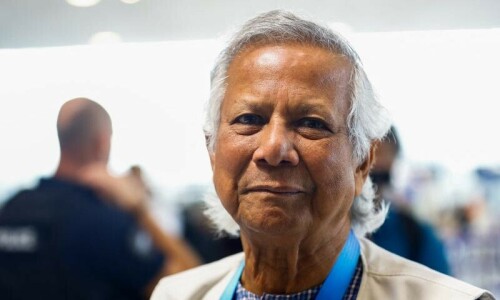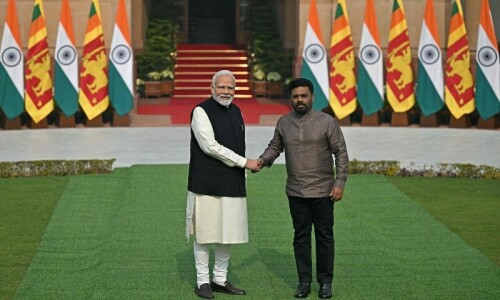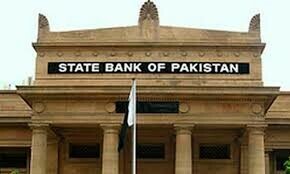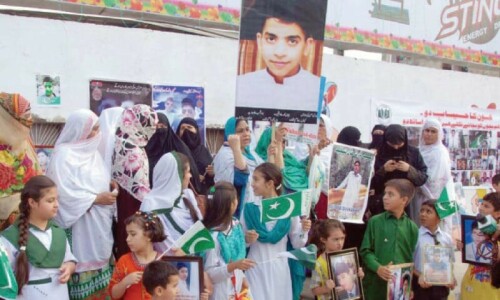THE rally of Nov 30 is over, having, thankfully, passed without incident. Imran Khan repeated his demands for an inquiry into alleged electoral rigging. However, yet again, despite the protestations about his quest for ‘justice’, he came across as a man hankering after power and, to that end, a reversal of history.
That was suggested by threats backing the demands: of consecutive wheel-jam strikes in Lahore, Faisalabad and Karachi, followed by a countrywide strike.
It was a moment of escalation of Khan’s war on the ‘system’ which, according to him, was corrupt and exploitative and unable to deliver to the man on the street. Given that Khan’s grievances over the issue of rigging need to be addressed urgently — and
there is a kind of jejune truth to what he says — one wonders if there is room for a utopian moment at this stage in Pakistan’s history.
Analysts insist on a comparison with Bhutto. However, unlike Khan’s discourse, Bhutto’s was rooted in social and political reality. And it had a known pedigree. Khan still has to identify his political creed.
‘Change’ does not constitute a creed. Wide-eyed credulity among the masses notwithstanding, it does not even serve as a valid slogan. All party manifestos pledge social and economic reform. If Khan subscribes to social democracy, he should say so and then spell out what his own version of it is likely to be.
Imran Khan must face certain home truths.
If, further, Khan plans to overthrow the ‘system’ — or the existing order — he must ask himself a few relevant questions. He could start by considering the fact that there is a very thin line between democratic agitation and what would merely qualify as anti-state activity. At some level, the ‘system’ is the state.
Khan must surely reckon with that. Moreover, quite simply, revolution runs counter to the norms of the democratic state. It is abhorrent to civil society and poses fundamental hazards to civic existence.
Coddled by the media, idolised by supporters and tolerated by the government, Khan is something of an enfant gâté of Pakistani politics. But there are certain home truths which even he must be made to face. Rather than get carried away by their own sensation-seeking and the heat of the moment, our media also owe it to the general public to alert them to these facts.
Colour and charisma and carnival aside, there is a nation it is incumbent on them to protect. The prospect of violence which is what Khan — and more especially his ally, Sheikh Rashid — has pointed to is not in the interest of well to do or poor alike.
The point is not whether the people of Pakistan are satisfied with the present government or, for that matter, the ‘system’. A mandate was delivered by them in 2013 and the odds are — judging by the findings of the Election Commission and despite Imran Khan’s government-bashing — that the PML-N was legitimately authorised to rule the country.
As for the ‘system’, that too has become, over time, despite all its flaws, an accepted mode of living. Change is undoubtedly desirable but not at the expense of stability or peace. We must bear in mind that any form of change can only, properly, be brought about within the parameters of the present set-up and not otherwise. We cannot, in other words, afford to bring the whole edifice down. If that is what the PTI proposes for us, we must be prepared to stop it in its tracks.
Khan speaks at length about the need for better healthcare and wider education. He is rightly concerned about human resource development. However, he must remember that each government has its own priorities and style of governance and can be criticised but not dictated to.
He can, if he wishes, go back to parliament and cast a dissenting vote. Also, there are budgetary constraints that have to be borne in mind. We are as much of a security state as we were in the past. However, the sheer volume of danger has increased owing to the threat, at the domestic level, of terrorism.
It is consequently a commonplace that defence spending cannot be curbed for the sake of the social sector. This is something we have historically learned to live with.
Also the nation cannot and should not be held hostage to a few controversial National Assembly seats. We understand the need for the setting up of a judicial commission. And clearly it is crucial that the government hold talks in this connection with Imran Khan.
But it is equally important that the PTI backs off from its extraordinarily savage stance. If it wishes to continue looking like a respectable political party and not an army of desperados and malcontents, it must abandon that. That does not augur well for it or for the country.
The writer is the founder chairman of Dialogue: Pakistan, a local think tank.
Published in Dawn December 3rd , 2014












































